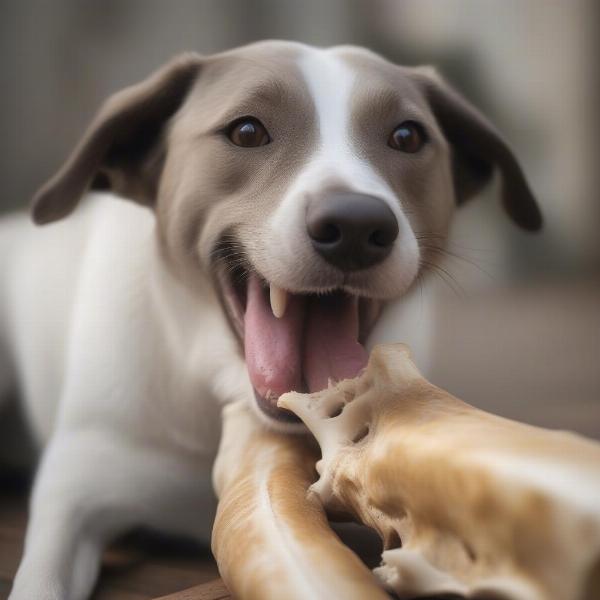Bone marrow bones are a popular treat for dogs, offering a flavorful and engaging chewing experience. But are they always a safe and healthy choice? This article dives deep into the world of bone marrow bones for dogs, exploring the benefits, risks, and best practices to ensure your furry friend enjoys this treat safely.
Understanding the Appeal of Bone Marrow Bones
Dogs are naturally drawn to bones, and marrow bones offer a particularly enticing combination of flavor and texture.  Dog Enjoying Bone Marrow The rich marrow inside provides a source of essential fatty acids and other nutrients, while the act of gnawing on the bone helps satisfy their instinctual chewing needs and can promote dental health by scraping away plaque and tartar. However, it’s crucial to understand the potential risks associated with bone marrow bones and take necessary precautions.
Dog Enjoying Bone Marrow The rich marrow inside provides a source of essential fatty acids and other nutrients, while the act of gnawing on the bone helps satisfy their instinctual chewing needs and can promote dental health by scraping away plaque and tartar. However, it’s crucial to understand the potential risks associated with bone marrow bones and take necessary precautions.
Benefits and Risks of Bone Marrow Bones for Dogs
While bone marrow bones can offer some nutritional benefits, it’s important to weigh them against the potential risks. The marrow is a good source of healthy fats, vitamins, and minerals. Chewing can also help relieve boredom and anxiety in dogs. However, there’s a risk of choking, especially with smaller dogs or aggressive chewers. raw bone marrow bones for dogs Splintering can also occur, leading to digestive tract damage or mouth injuries.
Choosing the Right Bone Marrow Bones
Not all bone marrow bones are created equal. Avoid cooked bones entirely, as they are more likely to splinter. Opt for raw, raw beef marrow bones for dogs appropriately sized bones from reputable sources. “The size of the bone should be large enough that your dog can’t swallow it whole,” advises Dr. Emily Carter, DVM, a veterinary nutritionist. “A good rule of thumb is to choose a bone that’s longer than your dog’s muzzle.”
Safe Handling and Supervision
Always supervise your dog when they are enjoying a bone marrow bone. Discard the bone once it becomes small enough that your dog could potentially swallow it. Limit chewing sessions to 15-20 minutes to prevent excessive wear on teeth and potential digestive upset. “Never leave your dog unattended with a bone marrow bone,” Dr. Carter emphasizes. “Even with the best precautions, accidents can happen.”
Alternatives to Bone Marrow Bones
If you’re concerned about the risks associated with bone marrow bones, several safer alternatives can provide similar benefits. raw marrow bones for dogs These include durable chew toys made from nylon or rubber, dental chews designed to promote oral health, and frozen treats filled with dog-friendly ingredients.
Addressing Potential Digestive Issues
While bone marrow is generally digestible, some dogs may experience digestive upset after consuming it, especially in large quantities. frozen marrow bones for dogs Signs of digestive problems can include vomiting, diarrhea, and constipation. If your dog experiences any of these symptoms after chewing on a bone marrow bone, consult your veterinarian.
Conclusion
Bone marrow bones can be a rewarding treat for dogs, offering both nutritional and enrichment benefits. However, responsible pet ownership requires careful consideration of the potential risks and adherence to safety guidelines. By choosing the right bones, supervising chewing sessions, and knowing the signs of potential problems, you can help ensure your dog enjoys this treat safely and healthily. marrow bones for dogs Always prioritize your dog’s safety and well-being when making decisions about their diet and treats.
FAQ
- Are cooked bone marrow bones safe for dogs? No, cooked bones are more brittle and prone to splintering, posing a serious choking and digestive hazard.
- How often can I give my dog a bone marrow bone? One to two times a week is generally sufficient, depending on your dog’s size, chewing habits, and overall diet.
- What should I do if my dog swallows a bone splinter? Contact your veterinarian immediately.
- Can puppies have bone marrow bones? Yes, but choose appropriately sized bones specifically designed for puppies. Supervise them closely while they chew.
- Are there any breeds that should avoid bone marrow bones? Dogs with aggressive chewing habits or a history of dental issues should be monitored carefully or given alternative chews.
- What are the signs of a blockage caused by a bone marrow bone? Vomiting, loss of appetite, lethargy, and abdominal pain are all potential signs of a blockage.
- Can I give my dog bone marrow bones if they are on a raw food diet? Yes, bone marrow bones can be a healthy addition to a raw food diet.
About ILM Dog
ILM Dog (https://ilmdog.com) is your trusted international resource for comprehensive dog care information, covering everything from breed selection and health to training, nutrition, grooming, and product recommendations. We are dedicated to providing dog owners worldwide with reliable advice and practical tips to ensure their furry companions live happy, healthy lives. Whether you’re a new dog owner or a seasoned expert, ILM Dog has the resources you need. Contact us today for personalized guidance: Email: [email protected], Phone: +44 20-3965-8624.